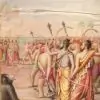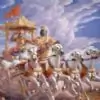Originally posted by: Chandraketu
Well, the theory doing the rounds here (which I consider very plausible, btw) is that Rama chose to divert public slander of Sita to a criticism of him. Had he done what I suggested above and massacred all the gossips, he'd still be criticized and diverting attention from innuendo about Sita, but without making her suffer. You are forgetting that in those times, kings had dictatorial powers, including in Ayodhya. So Rama was under no obligation to reward public innuendos about Sita by having her go through the Agni-pariksha.
Sorry, but no! If a Queen conspires to change the succession plans, like Kaikeyi did, it is a public affair. But if it's a question of whether the King believes in his queen or not, that's his and his affair alone, and nobody else's. Also remember, Rama forced the public to accept Dasharath/Kaikeyi's decision, and that too on a question that directly affected them, so don't say that he had no power to force his will on the public. If he could get the public to go along with a decision that so directly affected them, then how can one claim that he couldn't have done the same with a decision that had nothing to do with them - namely what he did in his private time? Also, the queen was a mere figurehead, and not an alternate ruler, as was the case with, say, Rani Durgavati or Rani Lakshmibhai of Jhansi. There was never any question of Sita ruling Ayodhya, or running things.Again, no it wasn't. I'll get to it later when the subject of the vanvas comes up, but like I once pointed out, there were a lot of things Rama could have done short of exiling her.




























